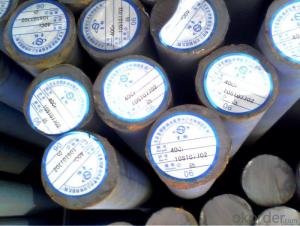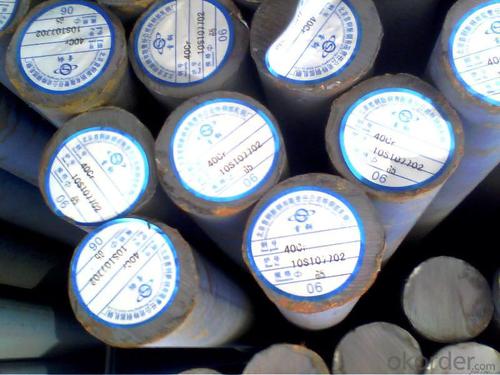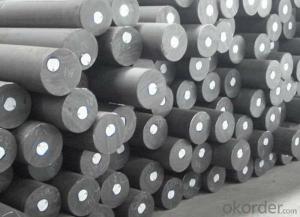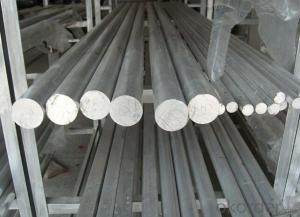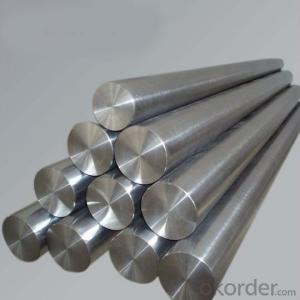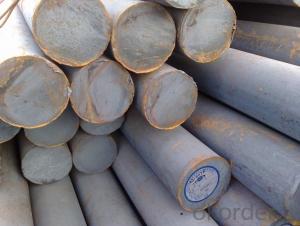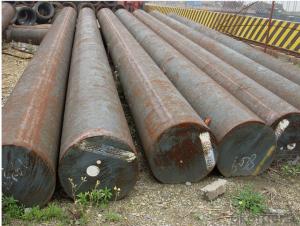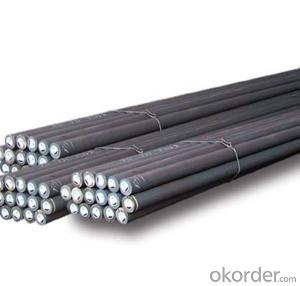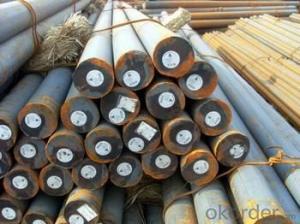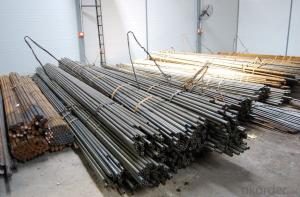Special Steel M2/6542/SKH9/1.3343 Round Bar Steel
- Loading Port:
- China main port
- Payment Terms:
- TT OR LC
- Min Order Qty:
- 25 m.t.
- Supply Capability:
- 10000 m.t./month
OKorder Service Pledge
OKorder Financial Service
You Might Also Like
Specification
Chemical Composition(GB)%
| Standard | C | Si | Mn | P | S | Cr | W | Mo | V |
| W6Mo5Cr4V2 | 0.55-0.65 | ≤0.40 | ≤0.60 | ≤0.030 | ≤0.020 | 3.70-4.30 | 6.00-7.00 | 4.50-5.50 | 1.70-1.10 |
| M2 | 0.78-0.88 | 0.20-0.45 | 0.15-0.40 | ≤0.030 | ≤0.030 | 3.75-4.50 | 5.50-6.75 | 4.50-5.50 | 1.75-2.20 |
Heat Treatment
| Item | Temperature℃ | Hardness |
| Anneal | 840-860 | ≤255HB |
| Quenching | 1150-1180 | ≥60HRC |
| Tempering | 560-580 | ≥60HRC |
Characterstics
| Good thermal plasticity |
| High abrasion resistance and red hardness |
Applications:Used for various tools,large thermoplastic forming cutting tools,abrasion resistance components operating under high load such as cold extrusion dies


1, Your advantages?
professional products inquiry, products knowledge train (for agents), smooth goods delivery, excellent customer solution proposale
2, Test & Certificate?
SGS test is available, customer inspection before shipping is welcome, third party inspection is no problem
3, Payment Terms?
30% TT as deposit and 70% before delivery.
Irrevocable L/C at sight.
4, Trading Terms?
EXW, FOB, CIF, FFR, CNF
6, After-sale Service?
We provides the services and support you need for every step of our cooperation. We're the business partner you can trust.
For any problem, please kindly contact us at any your convenient time.
We'll reply you in our first priority within 24 hours.
- Q: What are the main applications of special steel in the pharmaceutical industry?
- Special steel is widely used in the pharmaceutical industry for various applications. One of the main applications is in the manufacturing of pharmaceutical equipment and machinery, such as mixing tanks, reactors, and storage containers. Special steel is preferred for these applications due to its superior corrosion resistance, high strength, and durability, ensuring the safety and hygiene standards required in the pharmaceutical industry. Additionally, special steel is also used for the production of precision instruments and tools used in pharmaceutical research and development, ensuring accurate measurements and reliable results.
- Q: What are the different methods of preventing pitting corrosion in special steel?
- Various methods exist to prevent pitting corrosion in special steel. The objective of these techniques is to safeguard the steel surface from the harmful effects of its environment and hinder the development of pits. Some commonly used methods include: 1. Passivation: Passivation entails treating the steel surface with a chemical solution or coating to generate a protective oxide layer. This layer functions as a barrier, obstructing the infiltration of corrosive agents and minimizing the risk of pitting corrosion. 2. Alloying: By incorporating specific alloying elements into the steel composition, its resistance to corrosion can be enhanced. Elements like chromium, nickel, and molybdenum are frequently utilized as they augment the steel's capacity to form a stable passive film and withstand pitting corrosion. 3. Cathodic protection: This technique involves either utilizing a sacrificial anode or employing an impressed current on the steel surface. By making the steel cathodic, it becomes less prone to corrosion as electrons are drawn away from it, thus preventing pit formation. 4. Coatings: Applying a protective coating to the steel surface can effectively deter pitting corrosion. Coatings such as paint, epoxy, or polymer-based materials serve as physical barriers, shielding the steel against corrosive agents. 5. Environmental control: Regulating the surrounding environment of the steel can also assist in preventing pitting corrosion. This encompasses measures like controlling temperature, humidity, and pH levels to ensure they remain within acceptable limits, thereby inhibiting the corrosion process. 6. Regular maintenance: Consistent inspection and maintenance of the steel surface are vital in preventing pitting corrosion. Any signs of damage or deterioration should be promptly addressed to prevent further corrosion and potential pitting. It should be noted that the choice of prevention method relies on various factors such as the specific steel composition, the corrosive environment, and the intended application. Proper selection and implementation of these methods can significantly enhance the resilience of special steel to pitting corrosion, guaranteeing its longevity and performance.
- Q: Can special steel be used for making aerospace engine components?
- Yes, special steel can be used for making aerospace engine components. Special steel alloys, such as nickel-based superalloys and stainless steels, are commonly used in the aerospace industry due to their excellent mechanical properties, high temperature resistance, and superior corrosion resistance. These alloys are specifically designed to withstand the extreme conditions and demands of aerospace engines, including high temperatures, pressures, and stress levels. Additionally, special steel alloys offer high strength-to-weight ratios, which is crucial for reducing the weight of aerospace components while maintaining structural integrity. Therefore, the use of special steel in aerospace engine components ensures the reliability, performance, and safety of the engines in aeronautical applications.
- Q: What are the emerging trends in the special steel industry?
- Some of the emerging trends in the special steel industry include the growing demand for advanced high-strength steels (AHSS) in automotive applications due to their lightweight and high performance properties. Additionally, there is an increasing focus on sustainability and eco-friendly manufacturing processes, leading to the development of cleaner production methods and the use of recycled materials. Furthermore, advancements in technology and innovation are driving the adoption of specialty steels in sectors such as aerospace, energy, and construction.
- Q: What are the different types of heat treatment processes used for special steel?
- The different types of heat treatment processes used for special steel include annealing, normalizing, hardening, tempering, and quenching.
- Q: Can special steel be used in high-speed applications?
- Indeed, special steel can be utilized in high-speed applications without a doubt. Special steel encompasses a variety of steel alloys that have been intentionally developed and engineered to possess enhanced properties like exceptional strength, durability, and resistance to wear and corrosion. These properties render special steel appropriate for a wide range of demanding applications, including those involving high speeds. In high-speed applications, such as aerospace, automotive, machining, and power generation, the material must endure extreme conditions, including elevated temperatures, vibrations, and mechanical stress. Special steel is purposefully designed to meet these requirements and deliver outstanding performance even in the face of such challenging circumstances. For instance, high-speed steel (HSS) is a specific type of special steel formulated to retain its hardness and strength at high temperatures, which makes it ideal for cutting tools like drills, end mills, and saw blades. Similarly, stainless steel variants like martensitic and precipitation-hardening stainless steels are frequently employed in high-speed applications due to their exceptional strength, toughness, and resistance to corrosion. Furthermore, the advancement of cutting-edge manufacturing techniques, such as powder metallurgy, has facilitated the production of special steel with even superior properties, including higher hardness, improved wear resistance, and enhanced dimensional stability. These advancements have further expanded the range of applications for special steel in high-speed industries. To summarize, special steel is a versatile and dependable material that can be effectively utilized in high-speed applications. Its unique properties make it suitable for withstanding demanding conditions and delivering excellent performance, which is why it is the preferred choice for industries that require materials capable of enduring high speeds, temperatures, and mechanical stress.
- Q: How does the composition of special steel affect its properties?
- The composition of special steel significantly affects its properties. By varying the levels of elements such as carbon, manganese, chromium, and nickel, the steel can be tailored to possess specific characteristics. For example, increasing carbon content enhances hardness and strength, while adding chromium improves corrosion resistance. Additionally, the presence of different alloying elements can influence machinability, ductility, and toughness. Therefore, the composition of special steel plays a crucial role in determining its desired properties for various applications.
- Q: Can special steel be used in the production of medical implants?
- Medical implants can indeed utilize special steel materials. Examples of these special steels include stainless steel, titanium alloy, and cobalt-chromium alloy. These steels possess unique properties that make them suitable for medical purposes. Notably, they are biocompatible, meaning they do not cause any adverse reactions or toxicity within the human body. Additionally, they exhibit high strength, corrosion resistance, and the ability to withstand the harsh conditions found inside the human body. Consequently, special steels can be employed in the production of various medical implants, such as orthopedic implants like hip and knee replacements, dental implants, cardiac stents, and surgical instruments. By incorporating special steel into medical implants, durability, longevity, and biocompatibility are ensured, thus providing patients with a dependable choice to enhance their quality of life.
- Q: How does special steel resist thermal fatigue?
- Due to its distinctive composition and properties, special steel possesses the ability to withstand thermal fatigue. When a material experiences repeated cycles of heating and cooling, cracks form and ultimately lead to material failure. Special steel, on the other hand, is specifically engineered to endure extreme temperature changes. It possesses a high melting point and exceptional thermal conductivity, enabling efficient heat dissipation and minimization of thermal stress. Furthermore, the steel is often alloyed with elements like chromium, nickel, and molybdenum, which augment its resistance to thermal fatigue. The alloying elements within special steel create a protective layer that acts as a barrier against oxidation and corrosion. This safeguard prevents crack formation and enhances the steel's capacity to withstand thermal cycling. Additionally, the alloying elements enhance the steel's structural integrity by encouraging the formation of finely dispersed and evenly distributed microstructures. This, in turn, amplifies the steel's toughness and crack resistance. Moreover, special steel undergoes various heat treatment processes to further enhance its resistance to thermal fatigue. These processes involve controlled cycles of heating and cooling, refining the steel's microstructure and rendering it more resistant to deformation and cracking. The heat treatment also aids in alleviating any residual stresses that may have been induced during the manufacturing process. In conclusion, special steel resists thermal fatigue due to its distinctive composition, alloying elements, and heat treatment processes. Its high melting point, exceptional thermal conductivity, and protective layer against oxidation and corrosion make it highly resilient to thermal cycling. The refined microstructure and alleviated residual stresses further strengthen its ability to endure repeated cycles of heating and cooling without experiencing failure.
- Q: What is the significance of alloying elements in special steel?
- The significance of alloying elements in special steel is that they enhance the properties and performance of the steel. These elements are added in varying proportions to achieve desired characteristics such as increased strength, improved corrosion resistance, enhanced hardness, better heat resistance, or increased toughness. Alloying elements also play a crucial role in controlling the grain structure, reducing brittleness, and improving the overall mechanical properties of the steel. Thus, alloying elements are essential in tailoring the steel's properties to meet specific industrial applications and requirements.
Send your message to us
Special Steel M2/6542/SKH9/1.3343 Round Bar Steel
- Loading Port:
- China main port
- Payment Terms:
- TT OR LC
- Min Order Qty:
- 25 m.t.
- Supply Capability:
- 10000 m.t./month
OKorder Service Pledge
OKorder Financial Service
Similar products
Hot products
Hot Searches
Related keywords
